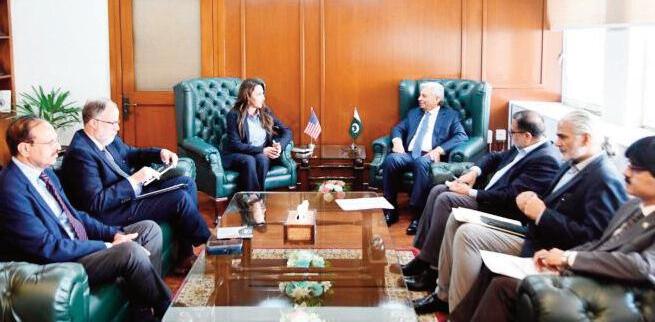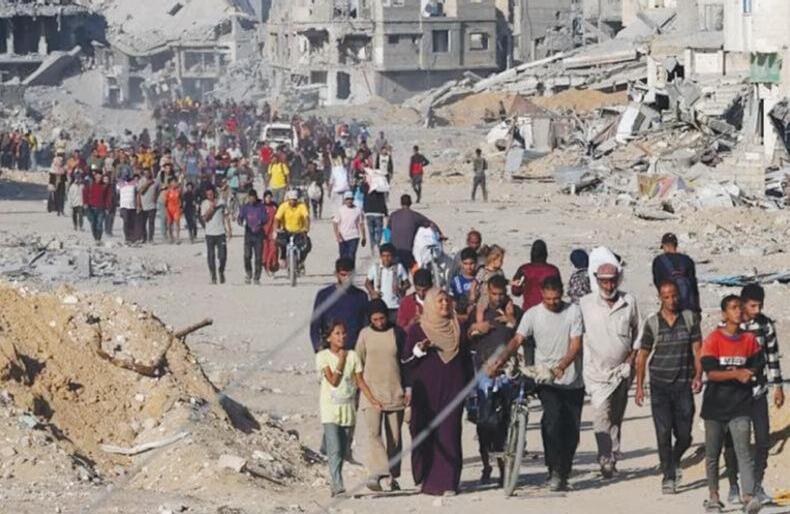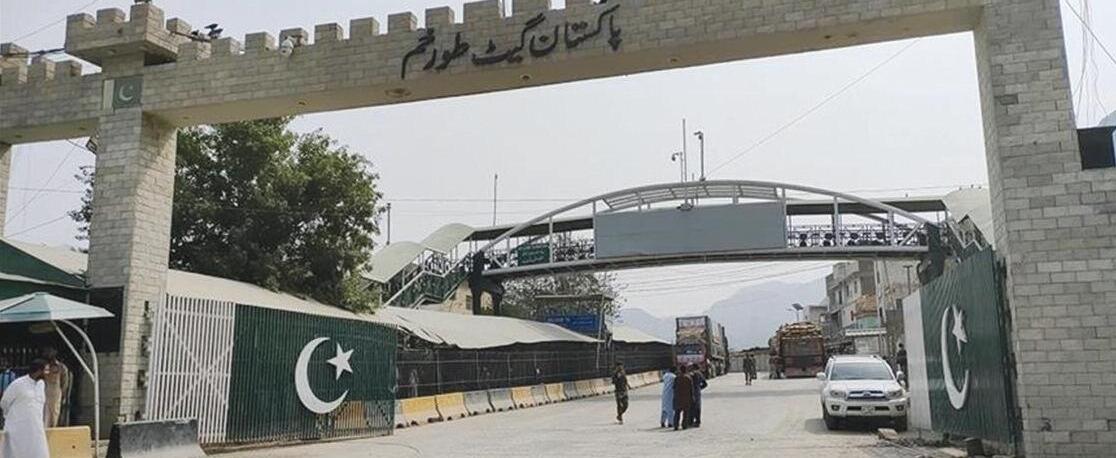

‘BALL IS IN K ABUL’S COURT’ AS ISL AMABAD SIGNALS READINESS FOR ‘CONDITIONAL DIALOGUE’: PM
g PREMIER SHEHBAZ
g W
g LAUDS ARMY, COAS FOR ‘NECESSARY ’ RESPONSE TO AFGHAN AGGRESSION, SAYING QATAR, ALLIES MAKING EFFORTS TO DEFUSE ISLAMABAD-KABUL TENSIONS
pakistan will be ‘constrained to a decisive response’ if ceasefire violated, warns asif
C hina backs lasting truce between pakistan and afghanistan



POWER DIVISION ALLOWS DISCOS TO OUTSOURCE MANPOWER TO TACKLE STAFFING SHORTAGES
Refiner y upliftment rises 21.6% YoY
Oil marketing association urges OGRA to stop overreach on deregulated produc ts
are paid
However it warned that forcing companies to disclose detailed client information could damage business confidence and disrupt legitimate operations
The association warned that such actions were creating confusion and fear among small traders and distributors, discouraging refineries from producing solvent-based by-products that are
The letter urged OGRA to: n Refrain from pressuring OMCs over deregulated products; n Stop demanding customer data on non-regulated items; n Align its actions with the government s Ease of Doing Business policy; and
n Focus on core regulatory functions within its statutory domain
OMAP noted that the solvent trade though small is a vital sector supporting refineries, OMCs, and small industries while contributing to national revenue “Rather than discouraging this legal business, OGRA should facilitate it and help remove genuine policy bottlenecks the statement concluded
The Securities and Exchange Commission of Pakistan (SECP) hosted a roundtable titled “The Future of Takaful in Pakistan in Karachi on October 16 2025 as part of its Insured Pakistan five-year strategic plan The event brought together Shariah advisors, international insurance brokers (AON and Guy Carpenter), and representatives from the insurance industry to discuss the development of the Takaful sector Commissioner Mr Mujtaba Ahmed Lodhi led the initiative, aimed at identifying policy and regulatory measures to boost Takaful’s market share, en-
hance Shariah-compliant financial inclusion and support ongoing economic growth and regulatory reforms
In his welcome address, Mr Lodhi emphasized the importance of collective ownership in driving the transition to Takaful and reaffirmed SECP’s commitment to providing a supportive regulatory environment
Mufti Ehsan Waqar a member of the SECP s Shariah Advisory Board, discussed the significance of transitioning to Shariah-compliant insurance following recent constitutional reforms, highlighting key challenges and the need for collaboration
The SECP team outlined the challenges and priorities for the Takaful sector and its broader efforts to promote
Islamic finance Representatives from the Insurance Association of Pakistan identified issues such as limited reTakaful capacity and the conversion of conventional insurance products International insurance brokers shared insights into global trends in reinsurance and re-Takaful highlighting both challenges and opportunities for Pakistan s Takaful industry
The roundtable concluded with an open discussion focusing on addressing re-Takaful capacity challenges, fostering innovation, and strengthening industry collaboration Participants commended the SECP s proactive approach and committed to advancing the Takaful industry in line with Pakistan s vision of becoming a fully insured nation

PAKISTAN SHOWCASES DIGITAL GROWTH AT GITEX GLOBAL 2025,

vision and three major Distribution
isters agreed that institutions such as the International Finance Corporation (IFC) and the Multilateral Investment Guarantee Agency (MIGA) could play a vital role in mobilising private sector investments in Pakistan Senator Aurangzeb also sought Saudi support for infrastructure development projects emphasising Pakistan s commitment to fostering a deeper economic partnership with the Kingdom Finance Minister Aurangzeb also held a key meeting with Azerbaijan’s First Deputy Finance Minister Anar Karimov reaffirming strong economic and strategic ties between the two countries
Hyder (Senior Procurement Specialist) Ahmad Imran Aslam (Senior Environmental Specialist) Imran u
hammad Omar Khalid (Consultant), Quratul Ain Hadi (Senior Financial Management Specialist), Syed Shan Ali Raza (Consultant), and Amna W Mir (Senior Program Associate) In June 2025 the Bank urged Pakistan’s Power Di-
Pakistan will be ‘constrained to a decisive response’ if ceasefire violated, warns A sif
pended, and visa applications were withdrawn after the latest clashes erupted According to the Inter-Services Public Relations (ISPR), the first confrontation occurred on the night of October 11–12, when Afghan Taliban forces supported by what it termed “Indian-sponsored elements of Fitna al-Khwarij launched an unprovoked attack along the border (Fitna al-Khwarij is a state term for terrorists affiliated with the banned Tehreek-e-Taliban Pakistan (TTP), introduced in May 2025 ) The 48-hour ceasefire, according to Pakistan’s Foreign Affairs Ministry was agreed at the behest of the Taliban regime following Pakistan s precision strikes on Taliban and terrorist hideouts in Kandahar and Kabul The ministry said the truce was reached with mutual consent to pave the way for constructive dialogue and a positive solution to a complex but solvable issue
CONTINUED FROM PAGE 01
The ball is now in their court, he remarked He said that if the Afghan authorities were sincere, they would initiate steps toward dialogue noting that Pakistan’s allies particularly Qatar were also making efforts to de-escalate tensions Premier Shehbaz expressed hope that the situation could be resolved on a longterm basis, including the elimination of the Fitna al-Khwarij from Afghan soil to ensure it is no longer used by terrorists The term refers to militants belonging to the banned Tehreek-i-Taliban Pakistan (TTP) He recalled that Pakistani officials had made multiple visits to Kabul for cordial
discussions aimed at resolving issues through mutual understanding “Unfortunately despite all efforts this was not possible And when the attack on Pakistan was under way, on India s full instigation, their Foreign Minister [Amir] Muttaqi was in New Delhi so we were compelled to respond comprehensively,” he said
The prime minister said the Emir of Qatar had condemned the escalation during talks with him in Egypt and expressed his willingness to help calm tensions
PM Shehbaz also praised the armed forces and Chief of Army Staff Gen Asim Munir for their “necessary and befitting” response during the border conflict noting the heavy sacrifices of Pakistan s security
personnel in counterterrorism operations GAZA CEASEFIRE
Turning to the Middle East the prime minister welcomed the ceasefire in Gaza calling it a great achievement that had saved lives in the besieged territory He deplored the politicisation of the issue within Pakistan and lauded the efforts of the United States and Muslim countries including Qatar Saudi Arabia Egypt Jordan Turkiye Indonesia and the UAE in securing the truce


The floods have been ignored by the IMF review
TH E prospects of a mini-budget are no longer as immediate as seemed likely during the IMF review team visit, but with the Staff-Level Agreement that has now been reached minibudget fears cannot be ruled out Pakistan’s appeals for a reduction in the revenue collection target because of the recent flood damage, has not been accepted, and Pakistan remains committed to pre-flood targets, and pre-flood predictions and forecasts of things like growth revenue collection and inflation which would all be affected by the flooding Another issue which the IMF raised was that the Governance and Corruption Assessment Diagnosis report be released by November Pakistan had claimed economic losses of 681 billion, while the Fund said that the losses were Rs 585 billion Even if the higher figure was accepted, it said, revision of targets would not be justified Meanwhile as part of its effort to identify risk factors in the economy it conducted in February a Governance and Corruption Assessment Diagnosis covering fiscal governance, central bank operations, financial sector oversight, market regulation, the rule of law, and AntiMoney Laundering and Combating the Financing of Terrorism (AML/CFT) In short from simply deciding how the economy is run, the IMF got into the business of deciding how the country is governed This expands the scope of the IMF s intervention in Pakistan s affairs to its governance, over and above the intrusiveness it has shown in economic management As the economy determines governance it already interferes The most recent example is how flood relief has been tied to fiscal discipline, and the government thus prevented from providing the succour that the people need While the government has been fulfilling the IMF’s demands so far it has been conceding it more and more sovereignty That cannot be right when the IMF is an organisation with an Indian Deputy Managing Director, who frequently meets Prime Minister Narendra Modi as an Indian who has made it abroad
The main question the government must face is whether it will shuck off the need for IMF programmes this time, or will it find yet again that it has no choice but to go to it if it wants to retain access to the money markets Are the economists at the IMF so bad that their solutions perpetuate the cycle of poverty? Or is that what they are supposed to do?

Dedicated to the legac y of late Hameed Nizami Arif Nizami (Late) Founding Editor
M A Niazi Editor Pakistan Today Babar Nizami Editor Profit
TH E Gaza Peace Plan has had the advantage of leading to a ceasefire, though no one trusts it to last Gazans were cruelly disappointed in arch when the January 36 ceasefire broke down This time too the same point of breakdown exists: hostages
Like the January 26 agreement the current peace plan is essentially a ceasefire and an agreement to exchange prisoners It is in the exchange of prisoners that the deal might collapse One of the more perturbing signs is that the withdrawing Israeli forces are not handing over to anyone At some point the Israeli government can decided to stay put in which case the ceasefire could again collapse Though there is an agreement to hand over the security of the Gaza Strip to an international force, no country has made any troop commitments
Though there is supposed to be an administration of Palestinian technocrats no name has been put forward let alone anyone accepting the task Though the committee and the funds (not committed by anyone either) are supposed to be supervised by a Peace Council headed by Donald Trump, its composition is still up in the air British ex-PM Tony Blair is the only person who has been mentioned and every shade of Palestinian opinion has expressed opposition to him having a role Finding someone who will act neutrally will be hard enough finding someone acceptable to all sides will be even ore problematic Whoever is chosen will find his integrity impugned no matter what he does, by one party or the other The real reason is that the proposed peace plan sweeps under the rug the real problem which is the existence of Israel Israel once had a number of pluses for Western nations It allowed them to put the problem of a racial minority outside of its own countries and it provided an outpost of the West in the exceedingly important oil-producing Middle east Not to forget its proximity to the Suez Canal Its usefulness was shown in 1956 when it went to War with the Arab states after Egypt nationalized the Suez Canal Israel might well be compared to the Crusader state set up after the 1099 conquest of Jerusalem by the First Crusade That too represented an attempt to turn the Holy Land into a replica of Europe The Kingdom of Jerusalem and the Counties of Edessa and Antioch were imitations of the feudal system prevalent in Europe just as much as Israel pretends to be a democracy Just as much as the Atrab states around Israel are engaging it diplomatically with some going as far as to recognize it, so did the Muslim states around it engage with the Crusader states, some going so far as to from alliances with them against other Muslim states It was only with the advent of Salahuddin Ayyubi that the Muslims found a leader implacably opposed to the Crusader kingdom and devoted to jihad
It is perhaps a paradox that the Crusaders slaugh-
tered all the Jews or Muslims they could find in Jerusalem when they took it and made sure that for the century of their occupation, they made sure that neither was allowed into it At that time, while the Crusaders viewed Muslims as pagans, heathens, an attitude which the West has adopted especially after 9/11 and which the Israelis encourage; they viewed Jews as Christ-killers something which Zionists have ensured that churches no no longer preach or even hold true One of the interesting similarities between the Crusader state and Israel was how both depended on foreign support Foreign support for the Crusaders came in the form of successive crusades a total of eight over just under four centuries However only the first three made an impact; the First taking Jerusalem the Second reinforcing it and the Third just failing to succour it The Fourth Crusade was supposed to retake Jerusalem, but got a little distracted, taking Constantinople instead and establishing the Latin Empire The remaining crusades were all failed ventures even though their aims were more limited than the conquest of Jerusalem which became an ultimate goal rather than an immediate one It is easy to understand the European fascination with Jerusalem They were Christians, after all, and their citizens went to the Holy Land on pilgrimage just as Muslims went to the Masjid Al-Aqsa Indeed before oil the pilgrimage provided a reason for interference and one of the issues of the 19th century was whether France or Russia was the protector of pilgrims (Before the 19th century the Ottomans had brooked no interference in Jerusalem, and had themselves been protectors of any pilgrims ) Because of this the Palestine issue is not simply one of national liberation though that is an important component Palestinians draw support from the rest of the Islamic world because of Masjid Al-Aqsa In a post-Christian world, Israel cannot expect the same support for


The hidden costs of Pakistan-S audi defence pac t

Oincident, designed to isolate Pakistan diplomatically and strategically, has instead evolved into a decisive strategic victory for Pakistan After decades of external pressures and internal political security and economic challenges Pakistan is repositioning itself not just as a marginal actor but as a pivotal force in the international arena Whether the Shanghai Cooperation Organization or the Arab Islamic Summit, or this latest defence accord between two brotherly Muslim nations, Pakistan is being widely recognized as a stabilizing agent in the region This historic shift in Pakistan s diplomatic mechanism is not mere ceremonial rather it reflects Pakistan s growing ability to navigate the complexities of global politics, recalibrate its diplomacy, and reclaim its role in international politics as a balancing power in a world in perpetual conflict There is little that is novel in the recent Strategic Mutual defence Agreement between Pakistan and Saudi Arabia Both states have long sustained a mutual strategic partnership including joint military training, exercises, and defence cooperation well before the formalization of defence relations Presently, an estimated 1500-2000 Pakistan military personnel are playing their roles in Saudi Arabia in advisor trainer and security provider positions Over the decades Pakistan has trained nearly 800010,000 Saudi military personnel and has periodically stationed units in the Kingdom to intensify defence cooperation Nevertheless, while this pact has created unlimited opportunities for Pakistan it simultaneously engenders a series of repercussions that may cause perilous effects on Pakistan in the long run
Entering into a defence agreement with one country inevitably exposes the country to complex and challenging strategic complexities In the international arena, diplomacy and prudence demand strategic manoeuvring rather than explicitly revealing your foreign policy agendas Yet Pakistan by pledging unequivocal military and diplomatic support to Saudi Arabia has exposed its regional agenda, a move that risks diplomatic isolation The challenging dilemma emerges if tensions between Riyadh and Tehran escalate: Pakistan while tacitly endorsing Tehran’s nuclear enrichment program despite sanctions has simultaneously
aligned itself with Tehran’s rival So these contradictory alignments in the craze of diplomacy will require Islamabad to walk a more precarious strategic tightrope, testing the very resilience of its foreign policy framework Moreover, Pakistan itself grapples with both internal and external security predicaments, ranging from the Baloch insurgency to crossborder terrorism emanating from western border with Afghanistan Entering into an expansive defence pact already scrambling Islamabad maybe proved as entangling for itself This defence pact can be proved as entangling for Islamabad in extraneous conflicts, be it Yemen’s civil war a prospective Saudi-Iran confrontation or Saudi s potential clashes with rogue and irresponsible Israel Militarily aligning with Riyadh implies a quasi-collective defence agreement, where attack on one state would be considered as an attack on both Such an involvement in external conflicts, for the sake of diplomacy risk overextending Pakistan’s strategic bandwidth A state already plagued by various internal and external security political and economic challenges cannot afford the burden of direct or even peripheral involvement in a volatile international theater Deeper military cooperation with Riyadh risks unsettling Pakistan’s nuclear doctrine, inviting more complexities for Pakistan in the global arena Pakistan s nuclear doctrine has long been officially declared as India-centric However any semblance of extended deterrence or nuclear umbrella to Riyadh would erode Islamabad s credibility within the global politics and potentially invite forms of sanctions from major powers already unhappy with Pakistan’s nuclear programme Such commitments expose guarantor states to entanglements in both regional and global conflicts and danger of potential escalation into wider wars In this alliance-oriented global political scenario, Pakistan would face severe domestic criticism, reputational damage, and the strategic defeat which would make New-Delhi comfortable By signing a defence agreement with Saudi Arabic Pakistan has unintentionally created strategic openings for its long-term adversary India, calibrating the regional balance to its advantages Leveraging its deepest economic ties,
soft power diplomacy and energy dependency with the Gulf states New Delhi can frame the pact as a destabilizing arrangement and simultaneously consolidate its partnerships in the region India s substantial investment leverage across the Gulf may further dilute Islamabad’s ambitions, in the Gulf region, after the pact Simultaneously Gulf states may perceive Pakistan s military-centric posture as a liability whereas India s image of soft power and economic stability can render New Delhi the more attractive and reliable ally In this volatile global scenario, Pakistan must pursue immediate measures to protect its strategic posture and current diplomatic momentum For this Islamabad must dispatch a high-level delegation including senior officials both civilian and military to the Gulf capitals to reassure partners of its benign intentions and simultaneously underscore its willingness to broaden its economic ties to counterweight New Delhi Equally important is the need for Pakistan to issue a precise statement for clarification about its nuclear doctrine that remains India-centric Such clarity would preempt misconceptions misinterpretations mitigate risks of sanctions and forestall diplomatic isolation on the global stage
In the longer horizon, firstly, Pakistan must recalibrate its foreign policy to reduce strategic vulnerabilities that Pakistan may face after this alignment with Riyadh Building on established partnerships with non-Gulf nations including China (Pakistan s iron-clad partner) Turkey and Azerbaijan, Islamabad must prioritize multilateralism and diversify its diplomatic, economic, and military engagements Multilateralism will not only mitigate over-dependence on a single country but strengthen Pakistan s image and credibility while countering Indian influence in the Arab world Secondly it is also imperative for Pakistan to pursue quiet and calibrated diplomacy between Tehran and Riyadh Pakistan must adopt a proactive approach with prudence and foresight: celebrating new alignments with restraint acting with strategic logic rather than emotional gratification and proactively safeguarding its national interest
The writer is a freelance columnist
In the long er horizon, firstly, Pakistan must recalibrate its foreign policy to reduce strategic vulnerabilities that Pakistan may face after this alignment with Riyadh Building on established par tnerships with non-Gulf nations including China (PakistanÊs iron-clad par tner), Turkey, and Az erbaijan, Islamabad must prioritiz e multilateralism and diversify its diplomatic, economic, and militar y engag ements.
Banks ignoring directives
Wasted rainfall
SAjjAd AlI MeMoN

The cost of patience and the case for accountabilit y
Pakistan’s stance on Afghanistan
FO L L O W I N G a series of deadly terror attacks inside Pakistan by TehrIk Taliban Pakistan militants operating from Afghan soil and escalating provocations by Afghan Taliban forces along the border Kabul has resorted to distorting facts rather than addressing realities The Pakistan–Afghanistan border tensions are neither abrupt nor unjustified they stem from years of cross-border terrorism nurtured within Afghanistan Pakistan has consistently stood by Afghanistan in its most difficult times while Kabul regrettably has never reciprocated that goodwill The question, therefore, arises: what has Pakistan truly done for Afghanistan and what has Afghanistan returned in kind?
When the Taliban seized Kabul in August 2021 the entire world shut its embassies and fled Pakistan however kept its mission operational facilitating safe passage for thousands of evacuees amid the chaos of withdrawal In global forums including the United Nations, Pakistan persistently called for unfreezing Afghanistan’s $9 billion assets to alleviate the humanitarian crisis Through platforms such as the Economic Cooperation Organization Islamabad championed relief efforts to support the Afghan population Pakistan s stance was one of peace and stability but in return, Afghan soil became a safe haven for TTP militants launching deadly attacks across the border Despite relentless provocations Pakistan continued to pursue dialogue through religious tribal and diplomatic channels In July 2022 an eight-member delegation of distinguished Ulema led by Mufti Taqi Usmani visited Kabul to appeal for restraint and cessation of attacks A 17-member tribal jirga soon followed with the same message of peace On 22 February 2023 Defence Minister Khawaja Asif and the then DG ISI led a high-level delegation to Kabul for talks on border management and counterterrorism Again, in July 2024, Interior Minister Naqvi headed another mission to strengthen coordination on security issues Pakistan’s diplomacy was backed by tangible action Under the stewardship of Special Envoy Muhammad Sadiq bilateral trade was revitalized through the Early Harvest Programme, which reduced tariffs on eight key agricultural commodities benefiting Afghan traders and boosting economic
cooperation Yet rather than reciprocating the Taliban regime allowed TTP’s violence to escalate Despite repeated assurances the Interim Afghan Government (IAG) has taken no action against TTP and Balochistan Liberation Army (BLA) militants entrenched within its borders Today, Fitna al Khawarij operates over 60 terrorist camps in Nuristan Kunar Nangarhar Paktiya Khost and Paktika functioning as crossfrontier launchpads into Pakistan s Khyber Pakhtunkhwa region Despite Islamabad sharing verifiable intelligence on these sanctuaries, Kabul s inaction exposes both complicity and indifference to regional peace
Since June 2025 Pakistan’s security agencies have recorded 172 organized Tashkils (a 36 percent increase) and approximately 4 000 Khawarij terrorists (a 48 percent rise) infiltrating KP from Afghan territory From Zabul, Paktika, Kandahar, Helmand, and Nimruz provinces, anti-Pakistan militants have also penetrated Balochistan 83 Tashkils comprising around 1 200 terrorists have crossed cisfrontier underscoring coordinated aggression
The 36th UN Analytical Support and Sanctions Monitoring Team Report (July 2025) substantiates Pakistan s concerns It confirms that Afghanistan s de facto authorities maintain a permissive environment for terrorist groups including Al-Qaida and TTP posing a grave threat to regional stability According to the report six Afghan provinces Ghazni Helmand Kandahar Kunar Uruzgan and Zabul host active Al-Qaida training camps under Taliban supervision Three new sites have reportedly been established where Al-Qaida and TTP fighters train jointly, proving their operational collaboration TTP with around 6 000 fighters continues to receive logistical financial and operational support from Taliban elements directly contradicting Kabul s repeated denials
Islamabad has repeatedly shared precise coordinates of these terror camps, yet instead of dismantling them the Taliban regime al-

lowed their expansion under GDI oversight The protection of the TTP leadership particularly its chief Noor Wali Mehsud who is said to reside in Kabul and reportedly receives $43,000 monthly, constitutes statebacked terrorism and a blatant violation of the Doha Agreement The recent Afghan social media uproar confirming Mehsud’s survival after an alleged attack in Kabul further validates Pakistan s position he is indeed being sheltered under Taliban protection The situation has worsened as Afghan nationals increasingly feature in TTP infiltration teams, proving that cross-border terrorism is now being exported as deliberate aggression Billions worth of sophisticated weaponry abandoned by NATO and US forces M16 rifles M4 carbines night vision devices, and thermal optics are now being used by TTP and BLA militants, allegedly sold to them by Afghan commanders In a recent assault on the Frontier Constabulary HQ in Bannu three of the six attackers including the suicide bomber were Afghan nationals Similarly a Talibanaligned group Tahaffuz-e-Imarat-e-Islami
Force claimed responsibility for the Dera Ismail Khan police school attack killing seven policemen In multiple terror incidents across Pakistan, over 207 Afghan nationals have been identified among the dead each with confirmed Afghan identity details Pakistan’s patience has been extraordinary but finite For over four decades Pakistan has sacrificed blood economy and stability for Afghanistan s peace Hosting over five million Afghan refugees providing education to more than 60,000 Afghan students, and constructing hospitals, schools, and infrastructure projects these are not gestures of convenience but acts of humanity and Islamic brotherhood unmatched in modern history Pakistan implemented the Afghanistan–Pakistan Transit Trade Agreement (APTTA), granting Afghanistan dutyfree access to ports and regional markets, alongside relaxed visa policies and border trade facilitation Yet Afghanistan’s response has been betrayal and hostility Its soil continues to be used for launching terrorist attacks on Pakistani
It is still not too late for Afghanistan to act like a responsible state and a brotherly neighbour. PakistanÊs goodwill, Islamic fraternity, and humanitarian spirit remain unmatched but patience has limits True regional stability depends on KabulÊs sincerity Pakistan seeks not confrontation, but cooperation grounded in mutual respect, verifiable security measures, and an end to terrorism emanating from Afghan soil.

The move would be viewed by China, Russia and Iran as a direct and aggressive challenge

Tof imperial hubris and strategic misadventure Britain burnt its fingers in the 19th and the early 20th century The Soviet Union exited in shame after a decade of brutal occupation (1979–1989) The United States, in turn, concluded its 20-year war in 2021 with a frantic and chaotic withdrawal, leaving behind a resurgent Taliban and billions of dollars in advanced military hardware The financial cost over the 20 years of deployment was an estimated $2 26–2 60 trillion but the cost to American prestige and strategic positioning was arguably greater Afghanistan, yet again, lived up to its grim moniker: the graveyard of empires
In a striking historical volte-face the United States under the second administration of president Donald Trump is now seeking to reacquire the very symbol of its former military footprint: the Bagram air base This move, articulated during a joint press
We re trying to get it back because they [the Taliban] need things from us We want that base back ’ However the strategic motivations of the United States run far deeper and carry significant risks of wider regional destabilisation
The Trump administration s renewed interest in Bagram, first discussed internally in March, is rooted in a multi-faceted and ambitious geopolitical strategy: Strategic surveillance of China: Bagram’s location is its primary asset Situated more or less than 800 kilometres from China s western border it offers an unparalleled vantage point Trump highlighted its proximity, noting that it is just
leverage and access to these resources countering China s near-monopoly on their global supply chain
Counterterrorism node: Despite the defeat of territorial caliphate of ISIS in Syria and Iraq, the group’s Khorasan province remains a potent threat in Afghanistan The administration believes Bagram could serve as a counterterrorism node for targeted operations against the group preventing it from establishing a stronger foothold and trigger neo-geopolitics around counter terrorism
Restoring regional influence: The 2021 withdrawal created a power vacuum that competitors namely China and Russia have been eager to fill The control of Bagram would reassert US influence on Central Asia a region traditionally within Russia s sphere of influence and increasingly courted by China It would directly challenge the expansion of China’s BRI and signal a renewed American commitment to the region
To understand the desired return of the United States one must first grapple with the logic of the initial departure If Bagram is so strategically invaluable as it is today, why was it not a non-negotiable asset during the withdrawal negotiations in 2020–2021? The answer lies in the fundamental nature of the Doha agreement and the political imperatives driving the US exit
The deal struck between the Trump administration and the Taliban in February 2020 was not a nuanced peace treaty It was a withdrawal agreement designed to facilitate a political exit Its core condition was the safe exit and a complete withdrawal of all US and NATO forces from Afghanistan For the Taliban this was the absolute cornerstone of the deal the very definition of victory Any proposal for the United States to retain a strategic outpost like Bagram would have been immediately rejected and would have collapsed the negotiations The Taliban’s entire insurgency was predicated on expelling foreign forces; agreeing to a permanent US base would have undermined their legitimacy and fractured their movement
Furthermore, the political context in the United States made retention impractical There was a powerful, bipartisan war-weariness and a strong public mandate to end what was widely perceived as a ‘forever war ’ The Biden administration which executed the withdrawal operated on the premise that the primary US objective, degrading al-Qaeda, had been achieved Maintaining a large, expensive base required thousands of troops, who would need to be protected from Taliban that viewed their presence as a violation of the agreement This would have necessitated a continued open-ended combat mission the very thing the American public and succes-
Trump highlighted its proximit y, noting that it is ‘just an hour away ’ from Chinese nuclear facilities
sive administrations sought to end The airfield itself is a palimpsest of great power rivalry Founded in the 1950s as a Soviet-built airstrip, it was the central command hub for the Soviet occupation throughout the 1980s After their withdrawal it became a no man’s land a frontline in the civil war between the Taliban and the Northern Alliance After the 9/11 attacks the United States transformed Bagram into the centre of gravity for its global war on terror, a massive complex capable of hosting thousands of troops and launching strikes across the regions, including the Middle East It is perhaps the only airbase in the world to have served as the primary military hub for two superpowers back to back but not learning the hard lessons about the limits of power in Afghanistan The reoccupation of the Bagram air base is fraught with perils of the geo-politics
Direct provocation of major powers: The move would be viewed by China Russia and Iran as a direct and aggressive challenge For China a US base so close to its border explicitly justified by the need for surveillance, would be a major escalation, likely triggering a forceful response, potentially including increased military cooperation with the Taliban and bolstering of its own border defence It could draw the United States and China into a close quarter situation even direct confrontation Similarly Russia would see this as an intrusion into its traditional sphere of influence and Iran would perceive a heightened threat on its eastern flank
Destabilising and Afghanistan: The Taliban regime is fragile Granting a base to the United States would be seen by many factions as a profound betrayal of the insurgency s core principles It could shatter the Taliban s cohesion, reignite civil war and make the United States a direct participant in Afghanistan’s conflicts once again The notion of peaceful coexistence with a permanent US presence is a fantasy
The desire to return to Bagram reflects a world where great power competition has superseded counterterrorism It is an attempt to correct what some now see as the strategic error of a full withdrawal However, the initial abandonment was not an oversight but a consequence of the realities of 2021
Reacquiring the base now would be an infinitely more complex endeavour than simply striking a deal with a desperate Taliban The return to Bagram may be a march towards a new confrontation that the United States and the world can ill afford Mohammad Abdur Razzak (safera690@yahoo com) a retired commodore of Bangladesh Navy is a security analyst
The Cour t of Appeals in a decision promulgated on Oct 3, approved a $100 million settlement agreement between the provincial government of Marinduque and Barrick Gold Corp of Canada
H E nearly three decades of legal battle over the environmental damage caused by the Marcopper mining disaster in the early 1990s finally came to an end after the Court of Appeals (CA) in a decision promulgated on Oct 3 approved a $100-million (P5 8 billion) settlement agreement between the provincial government of Marinduque and Barrick Gold Corp of Canada However it does not end the long wait for justice for the victims of the mining tragedy
Considered one of the worst mining and pollution disasters in Philippine history, at least 36 people died from heavy metal contamination caused by the accidental spilling of toxic mine waste that also left the Boac River dead The Marcopper Mining Corp fiasco actually involved two incidents On Dec 6 1993 the siltation dam of Marcopper collapsed and flooded the villages of Bocboc and Magapua in Mogpog, causing extensive damage to property and agriculture
Nearly three years later on March 24, 1996 a plug in a drainage tunnel at Marcopper ’s Tapian Pit failed releasing about 200 million tons of toxic mine tailings into the Makulapnit and Boac rivers
But more than the damage caused by the disaster, the Marcopper case was proof that some communities hosting large-scale mines benefit very little from them A paper published by the Asian Journal of Business Ethics in December 2014 titled Corporate and Public Governance in Mining: Lessons from the Marcopper Mine Disaster in Marinduque, Philippines, noted that Marcopper was one of the world’s biggest copper mines when it was operating from 1969 to 1996 employing between 1 000 and 1 500 workers
IMPRESSIVE FIGURES: During the mine s lifetime, it said Marcopper claimed to have contributed $1 3 billion in foreign exchange earnings, paid P6 5 billion in direct and indirect taxes, generated P635 million in domestic business paid out over P3 3 billion in employee salaries and benefits and contributed P347 million in the form of community assistance projects and subsidized electricity
“Contrast these impressive figures with the fact that Marinduque [in 2014] is a fourth-class province in terms of income with a poverty incidence of almost 30 percent Statistics such as these lend weight to the assertions made by residents that 27 years of large-scale mining failed to generate benefits for the people of the province,”
the ruling written by Associate Justice Jaime Fortunato Caringal Barrick will pay the $100 million over three years with the funds to be remitted to the provincial government s treasury account Under the deal, all funds are to be used by the provincial government “for lawful purposes
PHILIPPINE DAILY INQUIRER
Tariq Khan Tareen


Israel to reopen R afah crossing as ceasefire violations continue

clans
stipulated by the truce deal at any stage, rather all humanitarian goods bound for Gaza would pass through Israeli-controlled Kerem Shalom after undergoing security inspections With famine conditions present in parts of Gaza, U N Under-SecretaryGeneral for Humanitarian Affairs Tom Fletcher told Reuters in an interview on Wednesday that thousands of aid vehicles would now have enter Gaza weekly to ease the crisis Aid trucks rolled into Gaza on Wednesday
Israel has said the next phase of the 20-point plan to end the war engineered by U S President Donald Trump’s administration calls for Hamas to relinquish its weapons and cede power which it has so far refused to do Hamas has instead launched a security crackdown in urban areas vacated by Israeli forces, parading its power through public executions and clashes with local
remaining living hostages were freed on Monday in exchange for thousands of Palestinians jailed in Israel Longer-term elements of Trump s plan, including the make-up of an international stabilisation force for the small densely populated territory and moves towards creating a Palestinian state – rejected by Israel – have yet to be hashed out Massive Increase in Aid Needed
In a statement on Thursday, Israel’s military aid agency COGAT said coordination was underway with Egypt to decide a date for reopening the Rafah crossing for movement of people after completing the necessary preparations COGAT said the Rafah crossing would not open for aid as this was not
Modi faces tough Bihar state elec tion




PUNJAB GOVT INVOKES PECA L AW AGAINST IMRAN OVER ‘PROVOCATIVE’ SOCIAL MEDIA POST








Naqvi accuses TLP of armed violence during protests, asser ts govt sought peaceful resolution A C T S O F V I O L E N C E U N D E R G U I S E O F
R O T E S T U N A C C E P TA B L E : TA R A R

on Thursday accused the Tehreek-e-Labbaik Pakistan (TLP) of resorting to armed violence during its recent protests claiming that some of its groups opened fire at police despite the government s sincere efforts for a peaceful resolution Speaking at a press briefing in Islamabad Mr Naqvi

forces But apart from TLP leaders no action will be taken against any seminaries or religious figures the minister asserted Mr Naqvi said negotiations with the TLP had continued until 2:30am, but the group’s leadership “chose confrontation over dialogue ”
There seems to be a coordinated effort behind these protests, he remarked, hinting at broader forces influencing the unrest
Punjab-bound family among
crash
Security forces kill ‘up to 50 Fitna al-Khwarij’ terrorists in foiled infiltration bid
t
Security forces killed 45 to 50 militants belonging to the Indian proxy Fitna al-Khwarij while foiling an infiltration attempt along the Pakistan-Afghanistan border in Khyber Pakhtunkhwa security sources said on Thursday
According to the sources the operation launched under an intelligence-based operation (IBO) in Mohmand district targeted militants trying to cross into Pakistani territory under the cover of the ongoing ceasefire between Pakistan and Afghanistan Several militants were injured during the exchange of fire which continued for several hours, while the area was subsequently cordoned off for a clearance operation, the security sources added Prior to this security forces had killed 34 terrorists in three separate IBOs conducted in North Waziristan South Waziristan and Bannu
districts between October 13 and 15, the Inter-Services Public Relations (ISPR) said earlier on Thursday Sanitisation operations are being carried out to eliminate any other Indian-sponsored terrorists in the area, the ISPR statement said, reaffirming that the relentless counterterrorism campaign under the vision Azm-e-Istehkam as approved by the federal apex committee on the National Action Plan will continue at full pace to eradicate foreign-sponsored and supported terrorism from Pakistan Kabul-Islamabad escalating border tensions The latest operations come amid heightened tensions between Pakistan and Afghanistan following the Afghan regime s reluctance to act against terrorist groups operating from its soil amid a surge in cross-border attacks In response to recent aggression, Pakistani forces carried out precision strikes on key Taliban positions in
Afghanistan’s Kandahar province earlier this week, destroying multiple strongholds A day later both sides agreed to a 48-hour ceasefire at Kabul s request to allow for dialogue aimed at de-escalation
Since the Taliban s return to power in 2021, Pakistan has witnessed a sharp rise in cross-border terrorism, particularly in Khyber Pakhtunkhwa and Balochistan The two countries share a porous 2 500-kilometre border which serves as a vital trade and transit corridor but has also been exploited by militant groups Islamabad has repeatedly urged the Afghan Taliban to prevent its soil from being used by the banned Tehreek-e-Taliban Pakistan (TTP) and allied outfits for attacks inside Pakistan Its concerns have been echoed in a recent United Nations Security Council (UNSC) monitoring report, which pointed to operational, logistical, and financial linkages between the Taliban regime and the TTP
Punjab to recommend ban on TLP as Section 144 extended across province amid ‘sweeping crackdown’
LAHORE
s ta f f r e p o r t
The Punjab government is considering banning the right-wing
Tehreek-e-Labbaik Pakistan (TLP)
following violent protests that left dozens of police personnel injured even as it extended Section 144 across the province, prohibiting all forms of public gatherings, rallies, processions and sit-ins
Officials said the provincial government is weighing the pros and cons of placing the group on the Fourth Schedule of the AntiTerrorism Act (ATA) a move that restricts travel, speech, and financial activity of individuals linked to proscribed organisations
This would mark the second time the party faces a ban after a brief proscription in 2021 over similar violent demonstrations
The TLP s latest protest was meant to march toward Islamabad to stage a demonstration outside the US Embassy in solidarity with Palestinians but quickly turned violent Clashes erupted in Lahore and Muridke as demonstrators set vehicles ablaze and attacked security personnel injuring 48 policemen
Following failed negotiations police launched a six-hour operation at 3am in Muridke to disperse the mob, leading to mass arrests
The TLP claimed several of its workers were killed and alleged that party chief Saad Rizvi had been shot and injured though official sources have not confirmed this Province under Section 144
With tensions running high, the Punjab government extended Section 144 until October 18 citing security threats and the risk of
further unrest
According to a notification issued by the Home Department, the order bans gatherings of four or more people, restricts the display of weapons, and prohibits the use of loudspeakers except for azan and Friday sermons Authorities also banned hate speech sectarian publications and provocative material warning that such gatherings could be exploited by anti-state elements to trigger subversive activities
The restrictions however do not apply to weddings funerals or official duties and the Home Department has directed an awareness campaign to ensure compliance
Under the ATA proposal, TLP s assets would be taken over by the Auqaf Department, its social media accounts blocked bank accounts frozen and posters and advertisements removed

